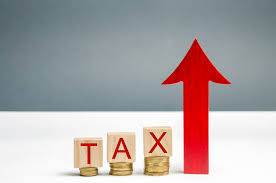Introduction to the new tax laws for small businesses.
As we near 2025, small business owners are preparing for major changes in tax regulations. The IRS has released a set of revisions that could affect various aspects such as deductions and self-employment taxes. It is essential for both bustling local shops and home-based services to comprehend these updated laws. Take a deep dive into our thorough analysis of the recent tax updates tailored for small businesses and be ready for what lies ahead!
Key changes and tax laws for small businesses.
A notable change in the 2025 tax updates for small businesses is the rise in Section 179 deduction limits. This adjustment enables business owners to deduct additional expenses associated with equipment purchases, resulting in a positive impact on cash flow. The IRS has recently implemented fresh regulations pertaining to self-employment taxes. These updates aim to streamline filing procedures but could result in alterations to estimated tax payments for numerous business owners. It is imperative to comprehend these modifications for effective financial planning.
Moreover, it’s crucial for S-Corps to stay up-to-date on the latest rules and regulations regarding the distribution and taxation of profits among shareholders. Proper compliance measures are key in light of recent changes to S-Corp taxes. Additionally, there is a separate set of deductions being offered specifically for green investments. Companies seeking to make sustainable investments can benefit from these perks while also making a positive impact towards environmental objectives.
How will these changes affect small business owners?
The upcoming tax laws for 2025 are expected to have a major impact on small business owners. Changes to deductions and credits may result in the need for a complete overhaul of their financial strategies. To illustrate, alterations to Section 179 deductions may influence businesses’ approach to acquiring equipment. Increased limits could spur greater investment, resulting in growth opportunities but also potentially introducing cash flow difficulties if not carefully handled.
Potential alterations to self-employment tax regulations may impact the amount of income that sole proprietors receive. These changes have the potential to either ease the weight of financial obligations or create complexities in managing personal finances, depending on each person’s unique situation. Furthermore, the changes made by the IRS regarding S-Corps may prompt owners to reassess their business structures. This reconsideration could present new opportunities or bring about added intricacies that require expert advice. Effectively managing these changes necessitates a proactive attitude and a willingness to modify well-established procedures.
Tips for navigating the new Tax laws for small businesses.
While the concept of the recently updated tax laws may seem daunting, there are methods that can make navigating them more manageable. To begin, it’s important to maintain thorough records of both your earnings and expenditures. This practice not only ensures precise reporting, but also allows for potential deductions to be fully utilized. It is worth your while to invest time in familiarizing yourself with specific changes such as the 2025 self-employment tax modifications or adjustments for S-Corp taxes. Being knowledgeable about these details can result in cost savings for you.
Seek the guidance of a skilled accountant who specializes in 2025 IRS small business tax updates. Their proficiency will assist you in navigating intricacies and maintaining compliance. Utilize technology with the help of small business accounting software, which often offers specialized features to assist with updates such as Section 179 deduction provisions. Stay updated on the latest information regarding 2025 tax deductions for small business owners by consulting reliable sources such as IRS announcements and attending professional workshops.
Potential benefits and drawbacks of the new Tax laws for small businesses.
The upcoming tax changes for small businesses in 2025 bring both advantages and challenges. Among these, the improved Section 179 deduction stands out as a notable benefit. This update enables larger deductions on equipment purchases, ultimately increasing cash flow and facilitating business expansion. While there are certainly benefits to be found, it’s important to note that there are also some potential drawbacks. For instance, the new IRS tax changes for small business in 2025 could bring with them certain complexities that may prove challenging for some owners to navigate. The added emphasis on record-keeping, in particular, has the potential to create confusion and increase the risk of errors during tax season.

Moreover, alterations to the self-employment tax may have an impact on individuals who run their own businesses or work as independent contractors. Though there are chances to cut costs through deductions, successfully managing these changes requires careful attention.It is crucial for small business owners to carefully consider the advantages and disadvantages before submitting their taxes this year. Having a clear understanding of the consequences of S-Corp tax alterations in 2025 will be vital in order to optimize gains and avoid drawbacks.\
Important deadlines and dates to remember.
Maintaining awareness of significant due dates is essential for small business owners. The IRS has established specific deadlines to keep in mind for 2025. January 15 is the designated deadline for self-employed individuals to make their estimated tax payments. This ensures that penalties are avoided and your finances remain on track throughout the year. April 15 marks another important deadline for individuals to submit their income tax returns. This date is particularly significant for those who run their business as an S-Corp or LLC, as it pertains to reporting and filing their earnings.
Mark your calendars for September 15! It’s the deadline for businesses to submit their third-quarter estimated taxes.Don’t forget, December 31 marks not only New Year’s Eve but also the last chance to utilize deductions such as the Section 179. Stay ahead of the game and be ready to reap the rewards before it’s too late.
Conclusion.
Looking towards the future in 2025, it is crucial for small business owners to be prepared for upcoming tax revisions that may impact their business practices and financial stability. Keeping up-to-date with these changes is essential. Having a clear understanding of the potential impacts of these laws will allow you to make wise choices and maximize your finances.Boost your proactive attitude by consulting with tax professionals who can assist you with these changes. Whether it involves utilizing new deductions or comprehending self-employment taxes, being informed is key.
Be sure to stay updated on all upcoming deadlines to avoid any potential penalties. This will ensure that you are in compliance with all necessary requirements.The upcoming IRS changes in 2025 create a unique landscape for small businesses, offering both obstacles and potential. To thrive in this changing environment, it is crucial to develop a customized plan that considers your specific circumstances. Staying informed about the most recent regulations will allow you to adapt seamlessly during this transition and pave the way for business expansion in an ever-changing market.






